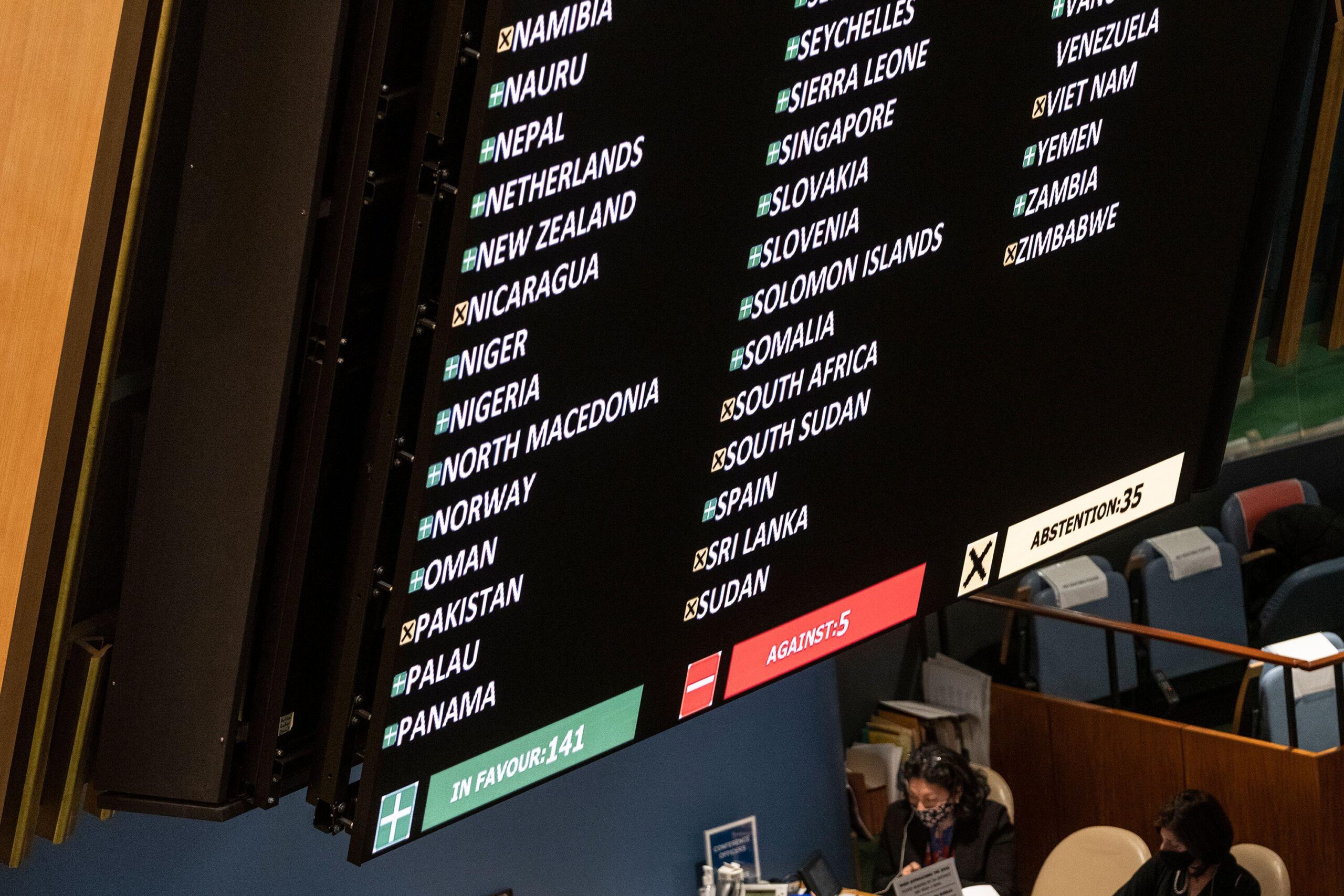 March 2022: Members' votes on the resolution to condemn Russia’s invasion of Ukraine displayed at the emergency session of the UN General Assembly. [photo: © Lev Radin/Pacific Press via ZUMA Press Wire/ Alamy]
March 2022: Members' votes on the resolution to condemn Russia’s invasion of Ukraine displayed at the emergency session of the UN General Assembly. [photo: © Lev Radin/Pacific Press via ZUMA Press Wire/ Alamy]
[This is an excerpt from an article in The Round Table: The Commonwealth Journal of International Affairs.]
Now, in the second year of the grinding Russo-Ukrainian war, is a time to reflect on a difficult question. Has Ukraine decisively lost the support of the South, formerly described as the developing world? Those concerned by the violation of the UN Charter – unprovoked aggression against a sovereign state, followed by verified human rights abuses – were mortified to see the Commonwealth states of India, Pakistan, Bangladesh, South Africa and Mozambique in the minority of abstainers on the first UN vote on the war. This year the USA has had to slap down Lula, re-elected Brazilian president, when he blamed both sides equally for the conflict.
Other wars and conflicts of different scales and intensity continue round the globe, in Sudan and the Middle East for instance. But seen from outside Europe the governments and peoples look on with anxiety at the wider disruption from another European struggle, following the world-wide damage caused in 1914–18 and 1939–45. Threats to food and fertilisers, to energy supplies and inflation, are universal. Onlookers’ capacity to rein in the belligerents is limited.
Russia has many friends, and its thesis that the Ukraine war is a rerun of the old NATO versus Warsaw Pact struggle evokes memories of the years of non-alignment, when newly independent states could play off one alliance against the other. The Soviet Union backed the African National Congress in South Africa when Margaret Thatcher described it as a terrorist organisation. In the important case of India, dependent for many years on Russian military equipment, the impact of western-driven sanctions against Iran has today reduced non-Russian options for oil, as the Indian High Commissioner to London pointed out in a recent address to the Round Table editorial board.
India’s quest for security and its neutrality in the Russia–Ukraine war
Shadow of Ukraine looms over Kigali
India resists growing pressure to condemn Russia’s Ukraine invasion
There is also the looming influence of China, purporting to play a mediating role in the war, while supplying covert assistance to its Russian ally. The degree to which countries in the South rely on Chinese trade and no-questions-asked investment, inside and outside the Belt-and-Road project, is significant; in Sri Lanka, which defaulted, Chinese investors in April have doubled down on their 2017 lease on Hambantota port by pouring a further $392 million into the port of Colombo, which has had $500 million over the past decade. The People’s Republic is a friend everywhere to despots and the economically challenged, and there are many governments that do not instinctively whistle the Ukrainian national anthem.
The sheer powerlessness of many states in the international system is often forgotten, as the frustrated efforts of small islands to get big greenhouse emitters to drastically cut greenhouse gas currently demonstrates. In due course the extra climate danger caused directly, and by the diversion of resources and will, by this new all-out European war, be measured by historians as they frazzle.
In Europe and the USA, strongest supporters of President Zelenskiy, there is a continuing lack of self-knowledge, a confusion of ‘the West’ with ‘the international community’, a forgetfulness that the second Iraq war was also an attack on a sovereign state, and that democracy, seen at close quarters, is not always as beautiful as its propaganda. The specific historic memories of Europe – of Hitlerite gobbling up of neighbours, of Russian expansionism, even of the Holocaust – are not shared in textbooks around the globe.
Richard Bourne is an Emeritus Member, The Round Table Editorial Board.



